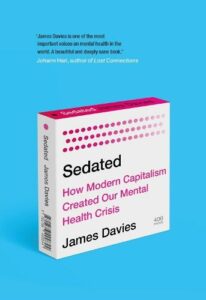Welcome!Log into your account
 Dr James Davies graduated from the University of Oxford in 2006 with a DPhil in social and medical anthropology. He is a Reader in Social Anthropology and Mental Health at the University of Roehampton, London, a psychotherapist (having practiced in the NHS), secretariat to the All-Party Parliamentary Group for Prescribed Drug Dependence and co-founder of the Council for Evidence-based Psychiatry (CEP). He is author of the bestselling book Cracked: why psychiatry is doing more harm than good and his new book Sedated: How Modern Capitalism Created our Mental Health Crisis is out now.
Dr James Davies graduated from the University of Oxford in 2006 with a DPhil in social and medical anthropology. He is a Reader in Social Anthropology and Mental Health at the University of Roehampton, London, a psychotherapist (having practiced in the NHS), secretariat to the All-Party Parliamentary Group for Prescribed Drug Dependence and co-founder of the Council for Evidence-based Psychiatry (CEP). He is author of the bestselling book Cracked: why psychiatry is doing more harm than good and his new book Sedated: How Modern Capitalism Created our Mental Health Crisis is out now. JD: Thanks, James, a very good opening question. I’ll give it a go, but let me start by first defining the term neoliberalism, which is generally used to describe the style of capitalism that has dominated most Western economies since the 1980s (in particular the UK and US). Once neoliberalism, under Thatcher and Reagan, began replacing the more ‘socialist’ style of capitalism that prevailed between the 1950s and mid-1970s, it altered society in many significant ways. It did this by greatly expanding the dominance and reach of the market through tax cuts (mostly for the wealthy); by empowering multinationals via wide deregulation (cutting ‘red tape’); and by dramatically reducing the state’s role in the economy through privatisation and cuts to labour, welfare and social protections.
JD: Thanks, James, a very good opening question. I’ll give it a go, but let me start by first defining the term neoliberalism, which is generally used to describe the style of capitalism that has dominated most Western economies since the 1980s (in particular the UK and US). Once neoliberalism, under Thatcher and Reagan, began replacing the more ‘socialist’ style of capitalism that prevailed between the 1950s and mid-1970s, it altered society in many significant ways. It did this by greatly expanding the dominance and reach of the market through tax cuts (mostly for the wealthy); by empowering multinationals via wide deregulation (cutting ‘red tape’); and by dramatically reducing the state’s role in the economy through privatisation and cuts to labour, welfare and social protections.